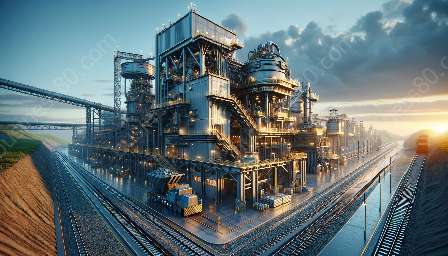Welcome to the captivating domain of powder metallurgy, a revolutionary process that plays a pivotal role in metals science and metals & mining. In this comprehensive guide, we will delve into the intricacies of powder metallurgy, exploring its production methods, diverse applications, and the plethora of advantages it offers to various industries.
The Genesis of Powder Metallurgy
Powder metallurgy is a fascinating branch of metallurgy that involves the production of a wide array of metallic components and products through the use of metal powders. This innovative process involves the formation of components or products from metallic powders, typically using processes such as compaction, sintering, and metal injection molding. With origins dating back to ancient civilizations, powder metallurgy has evolved significantly over the centuries, becoming a key player in modern manufacturing and materials engineering.
Production Techniques
One of the core aspects of powder metallurgy is the diverse range of production techniques it encompasses. These techniques include:
- Atomization: This method involves transforming molten metal into fine droplets using gas or water, resulting in the formation of metal powders.
- Mechanical Alloying: By employing high-energy ball milling, this technique facilitates the synthesis of alloy powders with enhanced properties.
- Compaction: During this phase, metal powders are compacted into a desired shape using mechanical or hydraulic presses, under high pressure and sometimes heat, to achieve the required density and strength.
- Sintering: This crucial step involves heating the compacted metal powders in a controlled atmosphere, allowing them to bond and form a solid component through diffusion and grain growth.
Applications Across Industries
The versatility and efficiency of powder metallurgy make it indispensable in a myriad of industries, including:
- Automotive: In the automotive sector, powder metallurgy is widely utilized for producing complex-shaped components such as gears, bearings, and structural parts, offering cost-effective solutions and excellent wear resistance.
- Medical Device Manufacturing: Powder metallurgy techniques are instrumental in the production of intricate and biocompatible components used in medical devices, implants, and surgical instruments, ensuring high precision and material purity.
- Aerospace and Defense: From critical aircraft components to intricate missile parts, powder metallurgy provides aerospace and defense industries with lightweight, high-strength, and corrosion-resistant materials.
- Electronics: The electronics industry benefits from the precision and miniaturization capabilities of powder metallurgy in the production of electrical contacts, magnetic components, and heat sinks for electronic devices.
Advantages of Powder Metallurgy
Powder metallurgy offers a plethora of advantages that set it apart from conventional metalworking processes:
- Resource Efficiency: By utilizing metal powders with minimal waste, powder metallurgy conserves resources and minimizes material loss during production processes.
- Complex Geometries: This method enables the production of intricate and complex component shapes that may be challenging or cost-prohibitive to achieve using traditional manufacturing techniques.
- Material Flexibility: Powder metallurgy allows for the creation of tailored material compositions and properties, including the production of advanced alloys and composites with specific characteristics.
- Cost-Effectiveness: With reduced machining and material waste, powder metallurgy stands out as a cost-effective solution for producing high-precision, near-net-shape components.
Embracing the Future of Powder Metallurgy
As technological advancements continue to drive innovation in materials science and engineering, powder metallurgy remains poised to play a pivotal role in shaping the future of manufacturing. With the ability to produce complex, high-performance components with remarkable precision and efficiency, powder metallurgy is set to continue its journey as a cornerstone of modern industrial processes.

